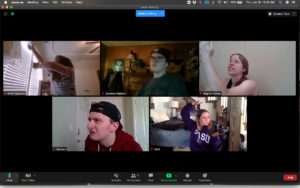
SFA theatre students rehearse on Zoom for the upcoming virtual presentation of Shakespeare’s “The Tempest.” The show can be accessed live online for three consecutive nights starting June 30 and in a recorded version the following three days, July 3 through 5. Online access can be purchased through the College of Fine Arts Box Office.
William Shakespeare’s “The Tempest” will be presented live online for three consecutive nights starting June 30 and in a recorded version the following three days, July 3 through 5. Online access can be purchased through the College of Fine Arts Box Office.
Selected for the School of Theatre’s SummerStage Festival, “The Tempest” is a story of isolation and loss, but it is also about the power of life to continue and of humanity to recover, according to Slade Billew, assistant professor of theatre and director of the play. The script blends tragedy, comedy, songs and magic.
The play will be “created” entirely over the internet, with rehearsals conducted via Zoom, and designers conceiving and creating work in their own personal spaces. The same theatrical instruction that was taking place in the classroom six month ago is now being delivered virtually.
“There will be all of the elements of a traditional production, just in a different medium,” said Billew. “We have students and faculty working with all of the areas of design. We are figuring things out within our limitations. For example, we can’t mail students theatrical lighting instruments, but we are coming up with ways to create unique lighting and sound effects in the spaces of the performers’ homes.”
Students will use a range of other tools, including some puppetry and a mix of built and found objects and costumes.
“We are looking for ways that students can be mailed costume or prop pieces,” Billew said, “or be sent files to print and assemble themselves. We want this to be as fully realized a production as possible.”
Billew anticipates encountering a range of technological glitches. “We also lose the creative energy of all being in a room together – something I know the country as a whole is struggling with right now,” he said. “Also, we are adapting to a whole new form of performance where the modes of creation and communication are different.”
In normal SFA production circumstances, theatre students work with a high level of theatrical design and technological support. While this is great for their education, it’s not what many of them will encounter in their early professional careers, Billew said, adding this new process will help them learn to create the best work they can with limited resources.
“Many early career theatre and film artists are now getting their start on YouTube and other platforms where they generate their own work,” he said. “This project will give our students a leg up in learning how to do that.”
Despite the need for actors to perform in front of live audiences, School of Theatre Director Cleo House Jr. predicts that theatre will be forever changed because of the pandemic, and SFA’s response to what’s happening “really is what theatre has always been about,” he said.
“Theatre remains in a consistent state change … of action and reaction … meaning the world happens around us, and theatre responds,” House said. “It reacts by holding up a mirror. Theatre has to be this way because it is a living yet ephemeral entity. Living things change; they adapt, they move, or they die. Our actions in moving forward with the support of the College of Fine Arts speaks to SFA’s continued value for the impact of what we do in theatre, and our audience support is appreciated and needed.”
Once donations/purchases are made for live performance, the School of Theatre will contact the purchaser by email three hours before the live performances to provide a link for access. Live performances are at 7:30 p.m. June 30, July 1 and July 2. The recorded performance will be available July 3 though 5. Passcodes for July 3 through 5 will be ongoing and released daily at noon. The link dies at midnight each night with a new link for each day. Access for each day should be purchased separately. Access levels range from $5 to $25.
To purchase online access, visit boxoffice.sfasu.edu or call (936) 468-6407 for online purchasing questions. For more information about the School of Theatre, visit theatre.sfasu.edu.



